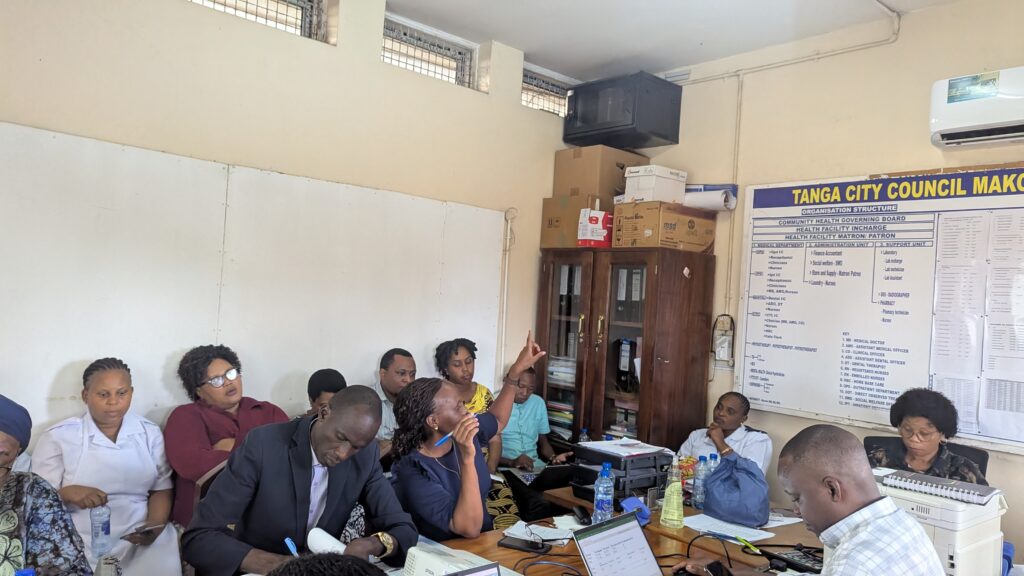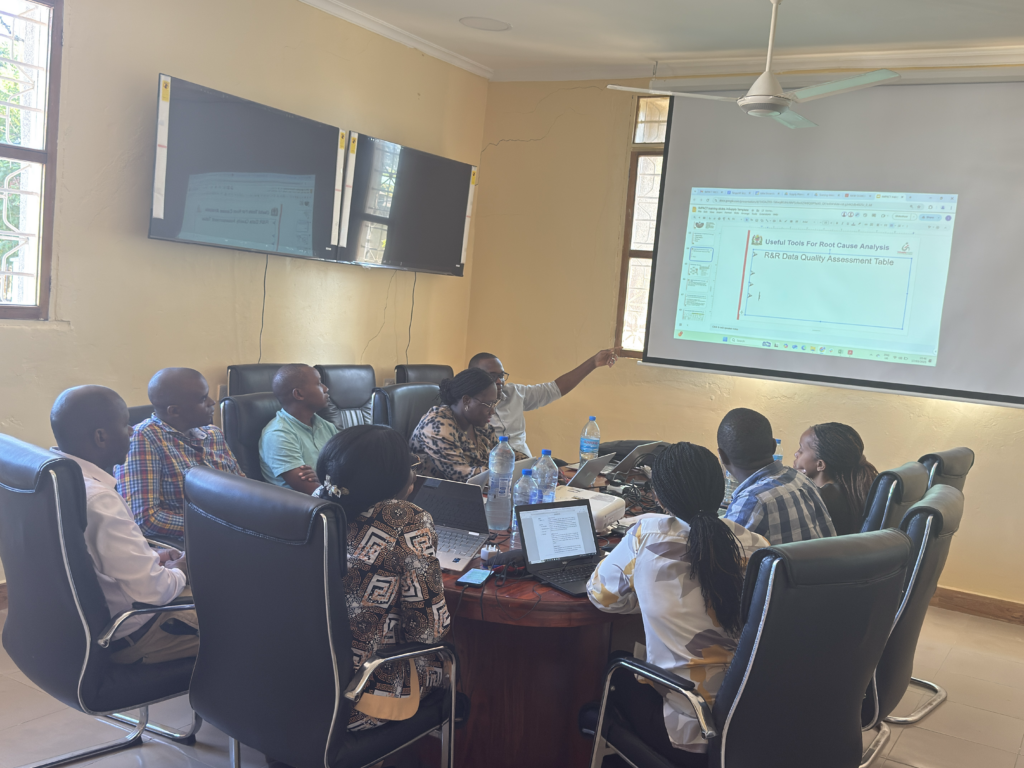
In Tanzania, many healthcare facilities face challenges in managing health commodities, which can result in stockouts or overstocking. These issues stem from limited data usage and decision-making capacity at the local level. However, imagine if every health worker had the tools not only to collect data but also to take action based on that information.
Since 2018, inSupply Health Tanzania has partnered with the Ministry of Health, the President’s Office–Regional Administration and Local Government (PO-RALG), and partners to implement the IMPACTT Approach. This approach is applied throughout all levels of the Tanzanian health system, from the national level to the last mile. The IMPACTT Approach enables healthcare workers to utilize data effectively, enhancing supply chain performance, reducing stockouts, and strengthening accountability. Key elements of this approach include periodic meetings to analyze data, identify problems, prioritize issues, conduct root cause analyses, develop action plans, and recognize achievements.
To ensure the effectiveness of the approach in the last mile, facility-level IMPACT Team training was piloted in Tanga Region targeting four health facilities in Tanga City Council, namely Tanga City Hospital, Makorora Health Centre, Duga Health Centre and Ngamiani Health Centre for health facility staff who frequently lack formal training in data analysis and supply chain management. These teams received training to consistently examine data, pinpoint supply chain challenges, and collaboratively address them.

Following the pilot, inSupply Health conducted two rounds of monitoring to assess progress and identify areas for improvement. A significant insight was that while teams were able to recognize issues through data, they often faced challenges in conducting root cause analysis and developing actionable work plans.
To address this gap, inSupply Health introduced a set of practical tools designed to strengthen data-driven problem-solving at the facility level.
- Root Cause Analysis Table: Helps teams go beyond symptoms to identify the real causes of issues.
- IMPACT Teams Meeting Feedback Template: R/CHMT use this template to provide feedback after reviewing facility IMPACT Teams Meeting Minutes
- R&R Data Quality Assessment Tool: Enhances the accuracy of Reporting and Requisition (R&R) data.
- Department consumption data tool: collects consumption data from each department and expiry dates for commodities
- Action tracking template; to follow up on the completion of action plans from IMPACT Team meetings .
These tools work hand in hand to enhance decision-making capacity, to strengthen data analysis and root cause analysis at the facility level.
Through coaching and on-the-job mentorship, facility teams practiced using these tools during regular IMPACT meetings. They learned how to extract insights from data, analyze root causes, and design practical solutions, skills that transformed their everyday workflows.
The result? More proactive, confident, and accountable facility teams.
One notable example is the Kisosora Health Center in the Tanga Region. Before implementing the IMPACT approach, the facility did not fully grasp the effect of poor quality data. The facility’s pharmacist admits that after the IMPACT approach, they are now more keen on the importance of quality data.
“I have become more careful with R&R reporting. At first, I would input any kind of data into e-LMIS, especially with the consumption data. Now, I understand the impact of the data entered, and I take greater care to ensure its accuracy.” Pharmacist at Kisosora Dispensary
To further reinforce the implementation of facility-level IMPACT Teams, regional and council health management teams (R/CHMTs) received targeted training on how to provide mentorship and support to their teams. Each member of the R/CHMT was assigned to a specific health facility to offer support. Their role involved regular follow-up and mentorship, including monitoring the implementation of action items, providing constructive feedback, assisting in resolving challenges encountered by the facility’s IMPACT Teams, and reviewing meeting minutes.
A major highlight of the facility IMPACT Teams in Tanga was the feedback meeting with the R/CHMT in Tanga, where key findings were presented, and progress was celebrated. One key moment was the special recognition of a Pharmacist from Kisosora Dispensary. This facility demonstrated exceptional performance across all DQA parameters, making it a shining example of how dedication to data quality can translate into better service delivery. A representative from the Ministry of Health took a moment to applaud the pharmacist’s remarkable contributions, calling them a “wonder” in driving change through improved data use.
“In my role as a Pharmacist at the Ministry of Health, I’ve had the privilege of visiting numerous health facilities across the country. When I applaud the performance of Kisosora Dispensary in terms of data quality, I genuinely mean it. Many of the facilities I’ve visited continue to struggle, particularly with the accuracy of consumption data.” Pharmacist from MOH
The success at Kisosora Dispensary is a testament to what is possible when healthcare workers are empowered and supported in their roles. Their commitment to data integrity has created a ripple effect, elevating the standard of performance for other facilities in the region. Recognizing frontline workers not only motivates continued excellence but also reinforces the importance of data as a foundational tool for decision-making. This story from Kisosora is a compelling example of how the IMPACT approach can unlock potential, transform systems, and improve health outcomes at the community level.
Conclusion
Facility IMPACT Teams have the potential to play a critical role in strengthening the health commodities supply chain by promoting effective data use at the last mile, where decisions directly affect patient care and supply chain outcomes. Empowering healthcare workers (HCWs) at service delivery points with the skills and tools to analyze and act on data leads to more accurate forecasting, reduced stock imbalances, and better resource allocation. Strategic investment in the use of digital platforms, such as GoT-HoMIS, enhances this capability, enabling real-time data capture and utilization at the point of care. By strengthening data use culture and capacity at all levels, from facility to national, we can create a more responsive, efficient, and resilient supply chain.
This work was conducted with support from the Gates Foundation through the Workforce Development in Public Health Supply Chains project, which aims to improve the effectiveness, sustainability, and resilience of public health supply chains for essential medicines and supplies in East Africa and beyond


